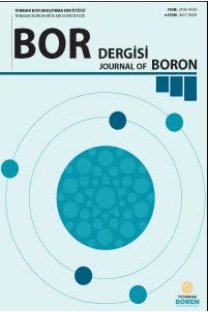Synthesis and characterization of Multi-Functional Material MoBP3O12
Borophosphate compounds, Hydrothermal synthesis X-ray diffraction, Nonlinear optic materials, POWD program,
___
- [1] Becker P., Borate materials in nonlinear optics, Adv. Mater., 10, 979‒992, 1998.
- [2] Chen C., Lin Z., Wang Z., The development of new borate-based UV nonlinear optical crystals, Appl. Phys. B, 80, 1‒25, 2005.
- [3] Aka G., Brenier A., Self-frequency conversion in non-linear laser crystals, Optic Mater., 22, 89‒94, 2003.
- [4] Chen C., Wu Y., Li R., Growth of large Mo18O52 single crystals by a vapor phase method, J. Crys. Growth, 99, 708‒715, 1990.
- [5] Fan T. Y., Huang C. E., Hu B. Q., Eckhardt R. C., Fan Y. X., Bayer R. L., Feigelson R. S., Second harmonic generation and accurate index of refraction measurements in flux-grown KTiOPO4, Appl. Optics, 26, 2391‒2394, 1987.
- [6] Harrison W. T. A., Gier T. E., Stucky G. D., The synthesis and Ab initio structure determination of Zn4O(BO3)2, a microporous, zinc borate constructed of “sused” subunits, of three- and five-membered rings, Ange. Chem. Inter. Ed., 32, 724‒761, 1993.
- [7] Wells A. F., Structural Inorganic Chemistry, 4th ed. Oxford University Press, Oxford, 1975.
- [8] Bell R. J., Carnevale A., A structural model for B2O3 glass, Philos. Mag. B, 43, 389‒413, 1981.
- [9] Rulmont A., Almou M., Vibrational spectra of metaborates with infinite chain structure: LiBO2, CaB2O4, SrB2O4, Spectrochim. Acta Part A, 45, 603‒610, 1989.
- [10] Kniep R., Engelhardt H., Hauf C., A first approach to borophosphate structural chemistry, Chem. Mater., 10, 2930‒2934, 1998.
- [11] Levesseur A., Olazcuaga R., Kbala M., Zahir M., Hagenmuller P., Couzi M., Etudes electrique et Raman des verres des systemes B2O3·M2O·M3PO4 (M=Li, Na), Solid State Ion., 2, 205‒213, 1981.
- [12] Shi Y., Liang J. K., Zhang H., Liu Q. L., Chen X. L., Yang J. L., Zhuang W. D. et al., Crystal structure and thermal decomposition studies of barium borophosphate, BaBPO5, J. Solid State Chem., 135, 43‒51, 1998.
- [13] Goetzman K., Karlheinz D., Dieter H. N., Ralfh G., Patent CA C09K015, 1996.
- [14] Bulur E., Goeksu H. Y., Wieser A., Figel M., Oezer A. M., Thermoluminescent properties of fluorescent materials used in commercial lamps, Rad. Pro. Dosi., 65, 373‒379, 1996.
- [15] Tanabe R., Sugimato N., Ho S., Manabe T., Patent CA Section 57 (Ceramics) CODEN: JKXXXAF, ICS: C03C008-08; C03C008-14, 95-274456, 23 Oct., 1995.
- [16] Kniep R., Gozel G., Eisenmann B., Rohr C., Asbrand M., Kızılyallı M., Borophosphate - Eine stiefmütterlich behandelte verbindungsklasse: Die kristallstrukturen von MII[BPO5] (MII=Ca, Sr) und Ba3[BP3O12], Ange. Chem. Inter. Ed., 33, 749‒750, 1994.
- [17] Hauf C., Friedrich T., Kniep R., Crystal structure of pentasodium catena-(diborato-triphosphate), Na5[B2P3O13], Crys. Mater., 210, 446-451, 1995.
- [18] Petkova P., Boubaker K., Vasilev P., Mustafa M., Yumak A., Touihri H., Soltani M.T., Infrared Spectroscopy of Undoped and Cu-doped (80-x)Sb2O3-20Li(2)O-xMoO(3) Glasses, AIP Conference Proceedings, 1727, 0217, 2016.
- [19] Zhu C., Wang J., Ren X., Zhang Y., Liu S., Shen J., Yue Y., Sintering temperature and atmosphere modulated evolution of structure and luminescence of 2CaO–P2O5–B2O3: Eu phosphors, J. Lum., 145, 110–113, 2014.
- [20] Byrappa K., Progress in Crystal Growth and Characterization of Materials, Pergamon Press, Frankfurt, 1991.
- [21] Franson M. A. H., Standard Methods for Examination of Water and Waste Water. American Publication Health Associations, the USA, 1995.
- [22] Capelle R., Microdosage colorimétrique du bore en milieu aqueux, au moyen de réactifs a groupement azol̂que ou imine dérivés des acides h et k, Anal. Chim. Acta, 24, 555‒572, 1961.
- [23] Zaijun L., Yuling Y., Jiaomai P., Jan T., 1-(2-hydroxy-3-methoxybenzylideneamino)- 8-hydroxynaphthalene-3,6-disulfonic acid as a reagent for the spectrophotometric determination of boron in ceramic materials, Analyst, 126, 1160‒1163, 2001.
- [24] Wu E., POWD, an interactive program for powder diffraction data interpretation and indexing, J Appl. Crys., 22, 506‒510, 1989.
- [25] Baykal A., Kızılyallı M., X-ray powder diffraction and IR study of NaMg(H2O)2[BP2O8]·H2O and NH4Mg(H2O)2[BP2O8]·H2O, Mater. Sci., 35, 4621‒4626, 2000.
- [26] Gozel G., Kızılyallı M., Kniep R., Characterization of a new calcium ultraphosphate, Ca3(P5O14)2, J Solid State Chem., 129, 196‒199, 1997.
- [27] Gozel G., Baykal A., Kızılyallı M., Kniep R., Solid-state synthesis, X-ray powder investigation and IR study of α-Mg3[BPO7], J Europ. Ceram. Soc., 18, 2241‒2246, 1998.
- ISSN: 2149-9020
- Yayın Aralığı: Yılda 4 Sayı
- Başlangıç: 2016
- Yayıncı: TENMAK Bor Araştırma Enstitüsü
In-situ formation of borides and enhancement of powder metallurgy properties
Tuncay ŞİMŞEK, Mustafa BARIŞ, Arun K. CHATTOPADHYAY, Murat BİLEN
Borate deposits: An overview and future forecast with regard to mineral deposits
Synthesis and characterization of multi-functional material MoBP3 O12
Halil GÜLER, Figen KURTULUŞ, Gülşah Çelik GÜL
Arun K. CHATTOPADHYAY, Mustafa BARIŞ, Tuncay ŞİMŞEK, Murat BİLEN
Alternating current electrophoretic deposition of HA and hBN nanoparticles on Ti substrate
Nuran AY, Yapıncak GÖNCÜ, Merve GEÇGİN
Merve GEÇGİN, Yapıncak GÖNCÜ, Nuran AY
Gülşah ÇELİK GÜL, Figen KURTULUŞ, Halil GÜLER
Borojipsin diamonyum hidrojen fosfat çözeltilerinde çözünürlüğünün incelenmesi
Havva Mumcu Şimşek, Rövşen Guliyev, Ayşe Vildan Beşe, Hacer İçen
Mikrodalga enerjisinin kolemanit cevherinin ufalanmasına ve flotasyonuna etkisi
